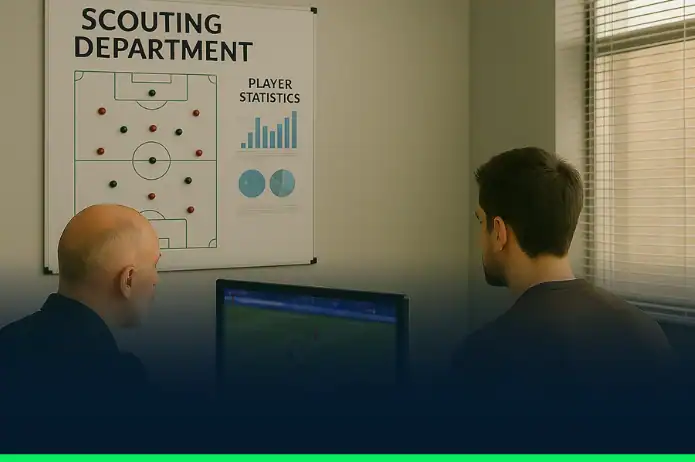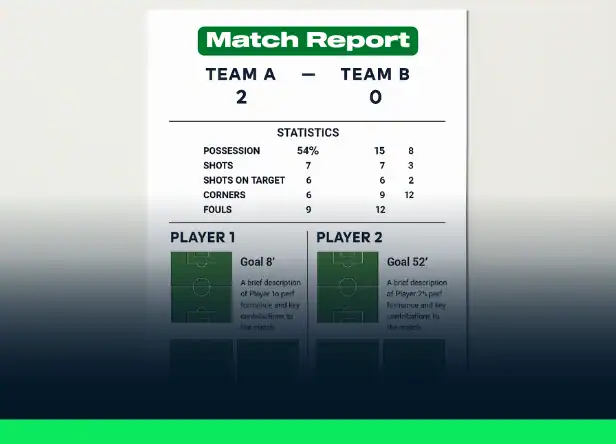A scouting department in a soccer club is the recruitment engine that identifies, assesses, and secures talent—be it rising prospects or seasoned professionals. Whether you aspire to become a scout or simply want to grasp how clubs unearth the next superstar, understanding this department’s structure and function is vital.
What is a scouting department? What are the roles within one? What does a head scout do? And how do you become part of a scouting department? A lot of questions! Let’s get into the details and break each one down. In this article, you will learn everything that you need to know about a Scouting Department.
What Is a Scouting Department?
Operating both domestically and internationally, the scouting department of a club consists of scouting specialists. Among their main goals are:
- Generate chances for young people inside the academy.
- Include fresh talent to strengthen the first team.
- Profitable player sales support the financial stability of the team.

Dedicated scouting divisions are staffed even by grassroots and semi-professional groups. Finding undervalued diamonds remains a top focus in the U. S. soccer pyramid, from MLS academies all the way down to NPSL teams.
What About the Scout’s Role? Scout’s Role Explained
A soccer scout—junior or senior—is the vital conduit between on-field performance and the sporting director’s strategy. Their matchday evaluations and analytical reports underpin every recruitment decision.
- Youth Scout: Focuses on U-15 to U-19 levels, forging relationships with local clubs, schools, and tournaments.
- Senior Scout: Tracks professional players worldwide, monitoring form, fitness, and contract situations.
Across both roles, scouts cultivate networks—coaches, agents, and club contacts—that feed the department’s scouting pipeline.
Key Missions of a Scouting Department
To better understand how a scouting department operates, it’s essential to look at the work done by the professionals within the department. A high-functioning scouting department must:
- Watch and evaluate matches
- Analyze the long-term potential of players
- Take notes and prepare detailed scouting reports
- Gather background info on the player(s) being tracked
- Know how to recruit players effectively
- Produce high-quality reports that increase the efficiency of team recruitment
How a Scouting Department Operates
While the specific operations can vary from club to club and country to country, most adopt a three-phase workflow:
- Identifying Needs
The head scout or recruitment manager first defines the team’s needs. One club might be looking for attacking profiles, while another might need to strengthen its central defense. Scouts must align with these specific demands. - Strong Team Cohesion
For the department to function effectively, there must be strong interpersonal relationships. Cohesion within the group helps foster better communication and more successful recruitment. - Budget and Sporting Strategy
To fully understand how scouting departments operate, you also need to consider the financial resources of the team and its overall sporting philosophy and define its scouting scope:
- Sporting Philosophy
A possession-oriented club seeks technically gifted midfielders, while a counter-attacking side values explosive wingers. The recruitment manager’s strategy filters down to every scout. - Budget Constraints
Clubs with larger transfer pools, like Atlético Madrid or LAFC, maintain dozens of scouts across continents. Conversely, lower-tier clubs prioritize local talent hubs and data-driven metrics to unearth bargains.
The Role of the Head Scout
To understand a scouting department, you need to know the responsibilities of the head of scouting. They are a key figure in player identification and recruitment and also ensure that the team functions cohesively. As the department’s linchpin, the head scout:
- Manages and coordinates all scouting activity.
- Approves target lists and signs off on transfer proposals.
- Serves as liaison between players’ entourages and the academy director.
- Oversees administrative tasks, from budget allocation to travel logistics.
- Maintains the scouting database, ensuring reports adhere to club standards.
In essence, the head scout blends managerial acumen with soccer expertise to drive acquisition quality and volume.
How to Join a Scouting Department?: The Pathway
There’s no single path to joining a scouting department. The first and most important step is to get proper training. A scouting course is the best way to learn the job and understand how talent identification works in soccer.
This role isn’t easy. Several key skills are required before you can enter a department as a young scout. In short, no single blueprint exists, but the typical route involves:
- Official Training
Register in qualified scouting programs like the FA’s Talent ID or Fritz Hüber Academy. - Technical Skills
- Physicality, decision-making, and grading methods define match observation.
- Data analysis: utilizing Wyscout, InStat, or Catapult Scout.
- Soft Skills
- Networking: developing relationships with families, coaches, and agents.
- Communication: concise, unambiguous scouting reports.
- Negotiation: managing contract conversations.
- Practical Experience
Intern with a youth academy, shadow senior scouts, or volunteer at local clubs.
Fundamental Scout Qualities
- Sharp Talent Eye: Discern development potential and raw talent.
- Analytical Mindset: combine qualitative observations with numerical information.
- Adaptability: Match studies with the club’s near and long-term requirements.
- Soccer Savvy: Thorough understanding of player roles, formations, and strategy.
Conclusion: Joining a Scouting Department
Dreaming of joining a scouting department in the U.S.? It’s entirely possible. But first, you’ll need to master the necessary skills—both technical and relational.
Becoming a scouting member calls for passion, persistence, and a professional attitude. Your contributions influence recruitment strategy, talent development, and finally, on-pitch performance from live scouting to thorough analysis.
Anyone can become a scout—as long as they’re passionate about the sport and committed to learning what it takes to do the job right. Start on this job armed with the right training, networks, and an unrelenting passion for the lovely game.
Don’t wait-check out our courses in soccer today:
🔹 Soccer Video Analyst Course
🔹 Soccer Scouting Course





